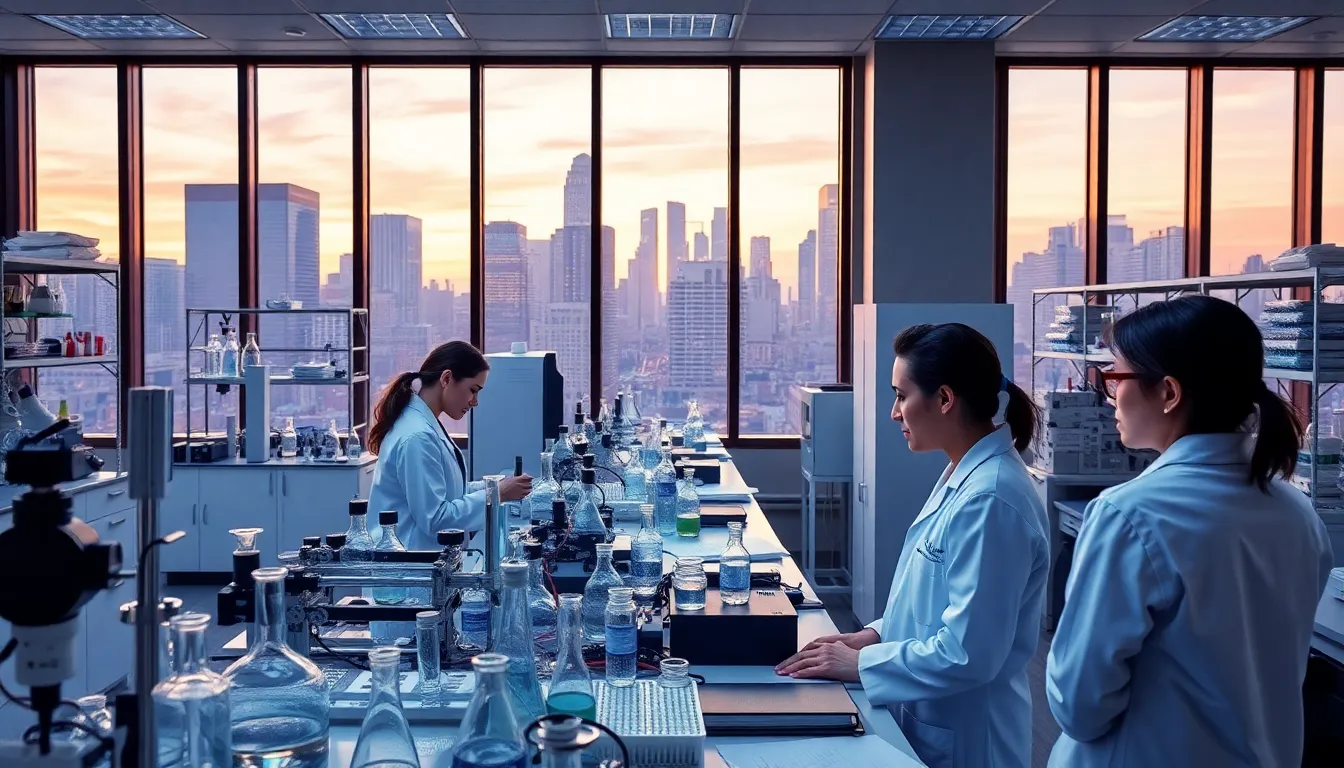Boston isn’t just the birthplace of baked beans and the Boston Marathon; it’s also the thriving heart of biotech innovation. With a cocktail of world-class universities, cutting-edge research facilities, and a sprinkle of entrepreneurial spirit, this city has become the go-to hub for biotech companies. If you’re looking to understand why Boston is the Silicon Valley of life sciences, you’re in the right place.
Imagine a place where brilliant minds gather to turn wild ideas into life-saving therapies. From gene editing to personalized medicine, Boston’s biotech scene is buzzing with creativity and ambition. So grab your lab coat and a cup of coffee, and let’s dive into the fascinating world of biotech companies that are not just changing lives but maybe even the world itself.
Table of Contents
ToggleOverview of Biotech Companies in Boston
Boston hosts an impressive array of biotech companies, leading the industry in innovation and research. The presence of renowned institutions such as Harvard University and MIT enhances its position as a biotech epicenter. Key companies operating in the region include Vertex Pharmaceuticals, Biogen, and Moderna, known for their significant contributions to biopharmaceutical development.
Research institutions drive many advancements in Boston’s biotech landscape. Organizations like the Broad Institute and Massachusetts General Hospital foster collaboration between researchers and businesses. This synergy promotes rapid progress in fields such as gene therapy, immunotherapy, and regenerative medicine.
Investment in the biotech sector remains high. In 2023, Boston biotech companies attracted over $3 billion in venture capital funding. The influx of capital enables developing cutting-edge therapies and expanding research capabilities.
Companies in the area emphasize collaboration and networking. Numerous incubators and accelerators, like LabCentral and the Boston Biomedical Innovation Center, support startups with resources and mentorship. These environments cultivate innovation and facilitate the growth of new biotech ventures.
Talent is another critical asset for Boston’s biotech scene. The city’s universities produce a highly skilled workforce equipped with scientific expertise. This availability of talent allows companies to recruit individuals who drive research and development efforts.
Boston’s biotech companies thrive due to their access to top-tier academic institutions, robust funding, and a collaborative ecosystem. This unique combination positions Boston as a powerhouse in biotechnology.
Key Players in Boston’s Biotech Scene

Boston’s biotech ecosystem thrives with a rich mix of established companies and emerging innovators, making it a global leader in biopharmaceutical development. Significant advancements arise from this dynamic interplay.
Major Companies
Vertex Pharmaceuticals, Biogen, and Moderna highlight Boston’s forefront in biotech. Vertex focuses on cystic fibrosis therapies and leverages cutting-edge research. Biogen specializes in neurological disorders, driving innovative treatments with a robust portfolio. Moderna gained recognition for its mRNA technology, especially during the COVID-19 pandemic. These companies substantially contribute to the local economy, attracting talent and resources, further strengthening Boston’s status as a biotech powerhouse.
Startups and Innovators
A vibrant startup scene fuels Boston’s biotech future. Companies like Ginkgo Bioworks and Allston Technologies lead the way in synthetic biology and biomanufacturing. Ginkgo Bioworks taps into genetic engineering to create custom organisms, revolutionizing industries. Meanwhile, Allston Technologies enhances drug development processes, paving the way for expedited therapies. Access to incubators such as LabCentral fosters collaboration and innovation, providing essential support for budding companies. This blend of startups and established firms enriches the biotech landscape, showcasing Boston’s commitment to transformative healthcare solutions.
Investment Landscape
Boston’s biotech sector thrives on substantial investments and a supportive environment, fueling its innovation. The city’s ecosystem attracts diverse funding sources, essential for its growth.
Venture Capital and Funding Sources
Venture capital plays a crucial role in Boston’s biotech landscape. In 2023, companies secured over $3 billion in venture funding. Seed rounds from firms like Third Rock Ventures and Flagship Pioneering empower early-stage startups. Investors recognize the city’s potential for high returns in healthcare. Strategic partnerships with established companies further enhance funding opportunities. Local firms, such as Polaris Partners and Matrix Partners, actively seek to invest in promising biotech ventures. Talent and innovation convince investors to bet on new therapies and technologies regularly.
Government and Institutional Support
Government support strengthens Boston’s biotech industry. State and local initiatives provide grants and tax incentives to encourage research and development. Massachusetts programs stimulate innovation through funding for collaborative projects. Federal resources from agencies like the National Institutes of Health also back biotech research. Institutions such as Harvard University and MIT contribute resources and expertise to the sector. Collaborative spaces like LabCentral promote interaction among startups and researchers. Combined support creates a robust foundation for the city’s biotech advancement, ensuring continued growth and innovation.
Research and Development Hubs
Boston serves as a critical hub for research and development in biotechnology, supported by its prestigious educational institutions and vibrant collaborative environment. This landscape fosters groundbreaking advancements in the field.
Leading Universities and Institutions
Renowned universities like Harvard and MIT contribute significantly to Boston’s stature as a biotech powerhouse. They provide cutting-edge research and innovations, establishing strong ties with biotech companies. Harvard’s extensive research in genetics influences therapy development, while MIT excels in synthetic biology and bioengineering. Academic institutions host numerous research initiatives, facilitating knowledge exchange that accelerates discoveries. Graduates from these institutions often pursue careers in local biotech firms, enriching the talent pool. Strong partnerships among universities, hospitals, and companies amplify research efforts, allowing for a seamless transition from ideas to viable therapies.
Collaboration Opportunities
Collaboration remains a cornerstone of Boston’s biotech ecosystem. Organizations like the Broad Institute and Massachusetts General Hospital promote research partnerships among academia and industry. These collaborations enhance access to resources, expertise, and funding, fostering innovation. Startups benefit from accelerators like LabCentral, which provide access to labs and mentorship opportunities. Shared workspaces encourage networking among entrepreneurs, scientists, and investors. Active collaborations often lead to breakthroughs in gene therapy and immunotherapy, ultimately benefiting public health. This synergy among diverse entities creates a dynamic environment for ongoing discovery and development in biotechnology.
Challenges Facing Boston’s Biotech Industry
Boston’s biotech industry faces several significant challenges, which could impact its growth and innovation potential. High operational costs remain a primary concern for startups; leasing laboratory space in Boston can exceed $100 per square foot. Competing for talent also poses difficulties. With numerous biotech firms vying for skilled professionals, attracting and retaining top-tier scientists can lead to resource strain.
Regulatory hurdles present another obstacle. Biotech companies must navigate complex FDA guidelines, which can delay product approvals and increase development timelines. These regulations, while crucial for safety, can inhibit rapid advancement in a fast-paced industry. Additionally, funding sources face fluctuations. Even though Boston’s biotech companies attracted over $3 billion in venture capital funding in 2023, economic downturns can affect investors’ willingness to provide additional capital for ongoing projects.
Collaboration challenges emerge as well. While many organizations foster partnerships, establishing effective communication and resource sharing among diverse entities can be difficult. Innovation often requires input from various specialists, yet silos can hinder information flow. Market competition intensifies the focus on proprietary technologies, leading to fewer collaborations and shared advancements.
Moreover, shifting patient needs can redirect research priorities unexpectedly. Market demands change; thus, biotech companies must adapt rapidly to stay relevant. Lastly, public perception of biotechnology impacts funding and support. Misunderstandings about genetic technologies or safety concerns may deter investment and collaboration, ultimately affecting progress.
Addressing these challenges requires strategic initiatives that unify efforts across the biotech landscape. Prioritizing collaboration, increasing funding avenues and enhancing regulatory communication can fortify Boston’s position as a biotech leader.
Future Trends and Predictions
Boston’s biotech sector is poised for significant growth driven by several emerging trends. Increased collaboration across academia and industry enhances research capabilities. The focus on personalized medicine continues to expand, with advancements in genomics significantly impacting treatment approaches.
Investment remains a cornerstone of this growth, with projections indicating continued influx of venture capital funding in the coming years. Companies in Boston are increasingly exploring synthetic biology applications, which could reinvent traditional therapeutic methods.
Healthcare accessibility is a growing priority, prompting biotech firms to develop cost-effective solutions. Innovations in mRNA technology represent a pivotal area, particularly following Moderna’s success. Suppliers within the supply chain are finding opportunities to leverage this momentum for newer therapeutic developments.
Regulatory frameworks are expected to evolve, with a stronger emphasis on fostering swift approvals for breakthrough therapies. Engagement with FDA agencies aims to streamline processes and increase transparency for biotech innovations.
Emerging disciplines such as digital health and AI integration are also gaining momentum. Companies leveraging these technologies are likely to enhance drug discovery and patient monitoring. A holistic approach to healthcare solutions will create additional partnerships among entities.
Addressing high operational costs remains crucial for sustaining growth. Initiatives focusing on affordable lab space and resources could mitigate challenges faced by startups. Building a supportive ecosystem fosters resilience against competition for skilled talent.
Balanced strategies, collaborative efforts, and attention to regulatory changes position Boston as a leading biotech hub poised for a transformative future. The dynamic landscape is set to reshape healthcare through continuous innovation and adaptation.
Boston’s biotech landscape is vibrant and full of promise. The city’s unique blend of academic excellence and entrepreneurial spirit fosters an environment ripe for innovation. As companies continue to push the boundaries of science and technology, they’re not just developing therapies but also redefining healthcare.
Despite facing challenges like high operational costs and regulatory hurdles, Boston’s commitment to collaboration and investment positions it for continued success. With a focus on personalized medicine and advancements in genomics, the future looks bright for biotech in this region.
The ongoing evolution of regulatory frameworks and the integration of digital health solutions will further enhance the sector’s potential. Boston is set to remain at the forefront of biopharmaceutical advancements, driving transformative changes in healthcare for years to come.



